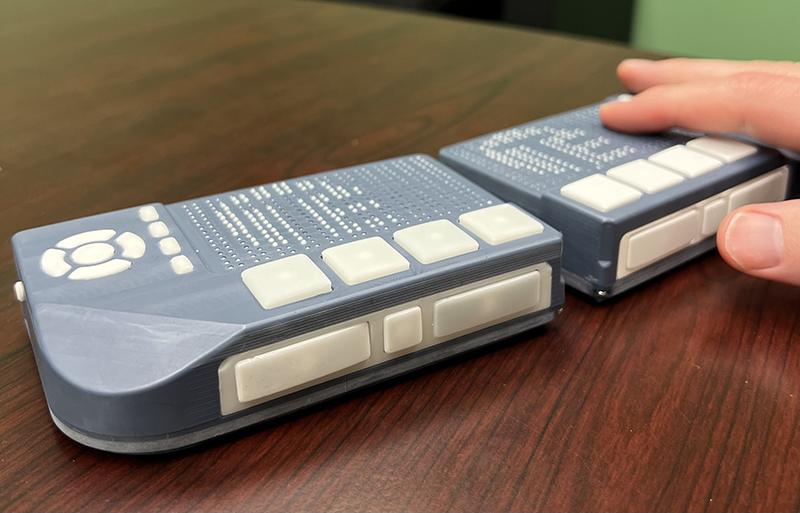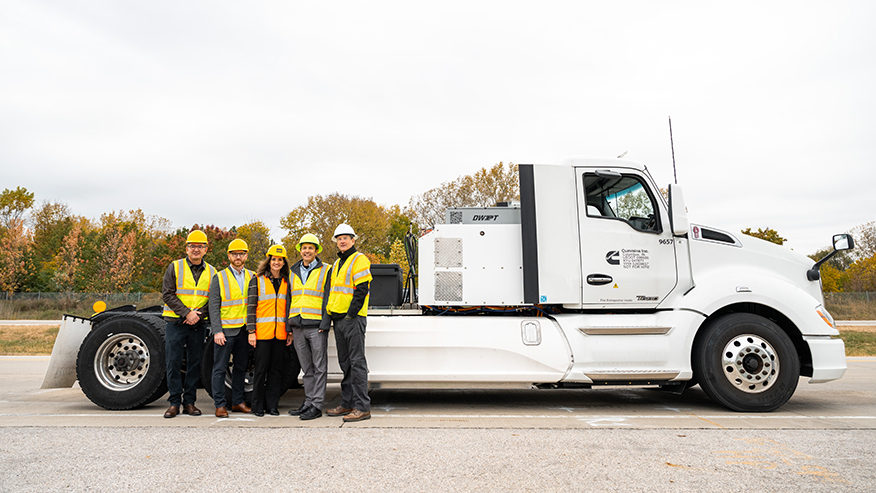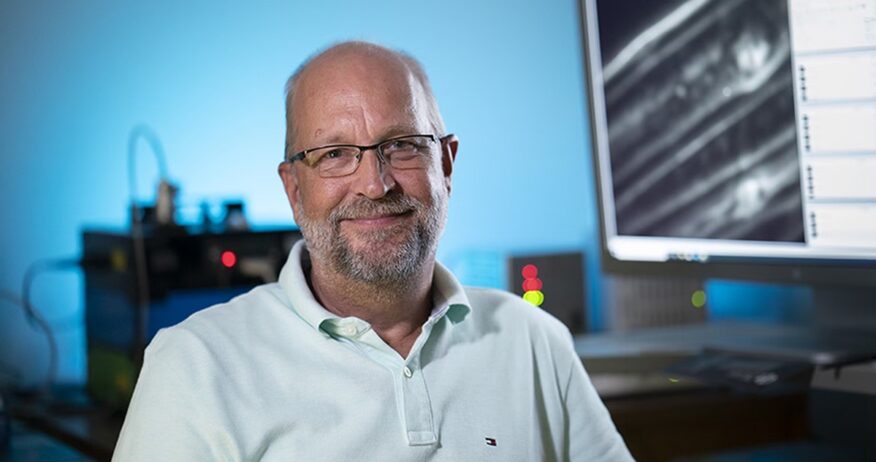Purdue Ventures invests $250,000 in assistive educational technology company
Tactile Engineering manufactures the Cadence tablet, which allows readers to access technical diagrams and read equations

Tactile Engineering Inc. manufactures the Cadence tactile tablet that allows readers to access up to eight lines of electronic Braille cells. It can be used as an e-reader, graphic calculator and image viewer. The company completed a $1.5 million round of funding, which included a $250,000 investment from Purdue Ventures. (Tactile Engineering photo)
WEST LAFAYETTE, Ind. —
Purdue Ventures, which manages three funds to support Purdue University-connected startups, has invested $250,000 in Tactile Engineering Inc., a company that has developed assistive educational technology to enable people affected by blindness and low vision.
Purdue Ventures’ investment is part of a larger $1.5 million funding round for Tactile Engineering that includes investments from Elevate Ventures, Queen City Angels and private individuals.
CEO Dave Schleppenbach said the company’s Cadence tactile tablet allows readers to access up to eight lines of electronic Braille cells.
“Students, professionals and leisure readers can use Cadence to navigate long equations and access technical diagrams,” Schleppenbach said. “Multiple Cadence devices can be linked to form larger readable surfaces.”
Cadence’s refreshable display of electronic cells uses standard Braille size, spacing and height. The modular cells are replaceable, and Tactile Engineering provides web-based support tools to enable remote calibration.
Schleppenbach said Cadence can be used as an e-reader, a graphing calculator and an image viewer.
“It downloads and displays books and documents in a wide range of formats,” Schleppenbach said. “It duplicates the functions of a traditional scientific calculator and allows users to pan, zoom and highlight its tactile output. It also can be used as an image viewer with animated, highlighted and interactive images to demonstrate scientific, geographic and other complex subjects.”
Additional applications are in development, including a web browser, classroom aids, annotation tools, and notetaker and leisure software. Cadence’s built-in Wi-Fi allows users to download and install new apps as they become available.
Schleppenbach said Tactile Engineering strongly supports the national objective to strengthen Braille literacy. He said literacy is critical for gaining employment, especially in high-demand technical and scientific roles.
“According to the National Federation of the Blind, 70% of adults who are blind are unemployed,” Schleppenbach said. “Of those persons with vision impairments who are employed, 90% are Braille-literate.
“Although advances in voice control and speech synthesis might seem to offer a solution to workplace accessibility, such tools cannot provide access to mathematics, technical content or graphics, all of which are vital for equal-opportunity STEM education and employment. The goal of providing this access drives everything we do at Tactile Engineering.”
Schleppenbach said the Purdue Ventures investment and the funding round will allow Tactile Engineering to invest in additional capital equipment, parts and labor to manufacture Cadence in larger quantities. He said the company has other significant ties to Purdue.
“Several of our founders and employees have a Purdue academic background; our original research in the field started while at Purdue,” Schleppenbach said. “The Purdue Manufacturing Extension Partnership has been immensely helpful in providing expertise to develop our robotic assembly plant. Finally, because Cadence has an educational focus, Purdue would be a great avenue for us to develop accessible content and test results with students.”
Riley Gibb, associate director of Purdue Ventures, said Tactile Engineering is a strong addition to the investment portfolio.
“Tactile Engineering has strong connections to Purdue University research, which is a key qualifier for an investment,” Gibb said. “We also appreciate the company is serving an unmet need – strengthening learning in the STEM fields for people who are affected by blindness and low vision – in a unique way with the multiple applications of its Cadence tool.”
About Purdue Ventures
Purdue Ventures manages multiple pools of capital in collaboration with the Purdue University entrepreneurial ecosystem and local corporations, enabling Purdue startups to improve the world. It has invested over $12 million since its formation. To support various technologies coming out of the university as well as student or alumni founders, Purdue Ventures manages three funds, each with a different investment focus. Ag-Celerator funds startups looking to commercialize Purdue IP or Purdue “know-how” technologies related to or impacting agriculture. The Foundry Investment Fund supports life science innovation by making up to 30% of institutional capital investments made in Purdue-affiliated startups. The Purdue Startup Fund supports innovation commercialization through early-stage investments.
About Tactile Engineering
Tactile Engineering was founded in 2013 with the goal of developing and manufacturing an affordable tactile graphics tablet for use by blind and visually impaired (B/VI) individuals around the world.
Writer/Media contact: Steve Martin, sgmartin@prf.org
Sources: Dave Schleppenbach, dschleppenbach@tactile-engineering.com
Riley Gibb, rtgibb@prf.org



